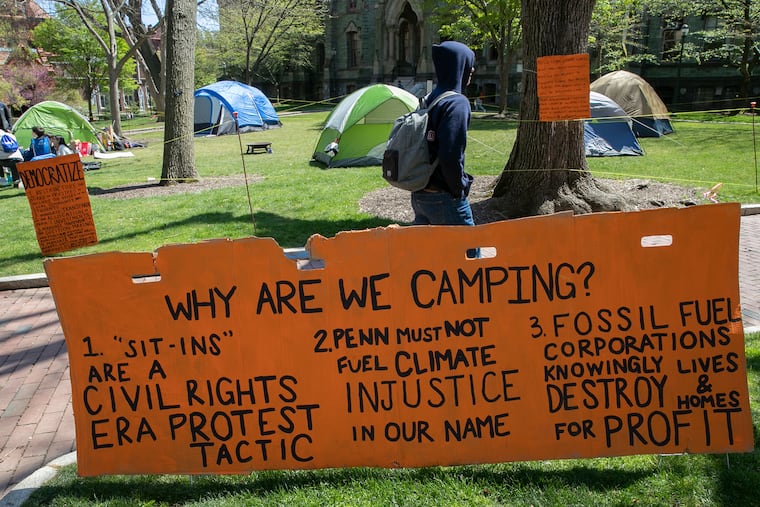Penn students are camping out on the campus green to get their environmental demands met
The College Green demonstration is the latest effort by Fossil Free Penn to get the Ivy League university to cut all ties with fossil fuel companies.

A group of students pushing the University of Pennsylvania to divest from fossil fuels among other demands rooted in environmental justice has set up tents on the College Green to share their message around the clock.
“We’re planning on staying for the foreseeable future,” said Emma Glasser, 21, a junior material science engineering major from Princeton and member of Fossil Free Penn.
There were about 20 students camping overnight Tuesday until campus police arrived and asked them to leave, Glasser said. Six students remained through the night and more joined in again Wednesday morning.
The university did not immediately respond to questions about the group’s presence on College Green or its demands.
The College Green demonstration is the latest effort by Fossil Free Penn to address a longstanding gripe with the Ivy League university about its ties with fossil fuel companies. Penn trustees in 2016 decided not to divest, saying the isn’t a “moral evil.”
In 2019, students took over a Penn board of trustees’ meeting, chanting in unison: “We demand a town hall because the impact of the fossil fuel industry is genocidal.” University officials warned students that they were violating “the open expression guidelines” and could face disciplinary action.
» READ MORE: A new wave of activism on campus: Students aggressively seek their demands
In 2020, students heralded a small victory when Penn announced it has no direct investments in the thermal coal or tar sands industries and didn’t expect to put its money there in the future. Critics often point to those industries as the most problematic: Thermal coal and tar or oil sands are used in power production, and the extraction, transportation and burning of those fossil fuels is often cited as factors in climate change.
But Glasser said Penn’s 2020 announcement left students with many questions that they haven’t been able to get answered. Students continue to question whether Penn has involvement in fossil fuels and want the university to take other environmentally conscious steps, including refusing to take research funding or donations from the fossil fuel industry and banning oil and gas companies from recruiting at campus career fairs.
» READ MORE: Students are celebrating a small victory after Penn announced it won’t invest directly in some fossil fuels
Students also are calling on Penn to make Payments in Lieu of Taxes (PILOT) to help city schools, Glasser said. Penn in November 2020 announced it would donate $100 million over 10 years to the Philadelphia School District to remediate environmental hazards, including asbestos and lead. But that is not considered a PILOT.
And students want Penn to involve the community, students and staff in more decision-making, she said.
“We’re trying to create a community where we can imagine a better world and better community together,” Glasser said.
» READ MORE: Residents and activists protest a planned demolition of low-income housing in West Philly
Earlier this week, some Penn students and alumni disrupted a prestigious university forum where Interim President Wendell Pritchett was talking with filmmaker Ken Burns, who is scheduled to be Penn’s commencement speaker, according to the Daily Pennsylvanian, the student newspaper. Students demanded that the university help residents of the University City Townhomes, who are facing eviction because their homes are slated for demolition. Pritchett said he would speak with the group, Save the UC Townhomes Coalition, after the event, according to the newspaper.